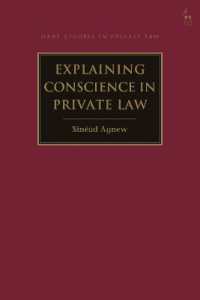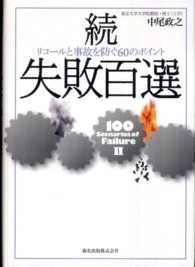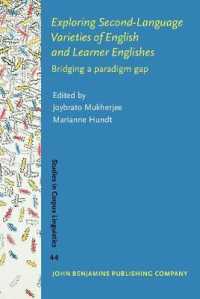- ホーム
- > 洋書
- > 英文書
- > History / World
Full Description
Argentina's Partisan Past is a challenging new study about the production, the spread and the use of understandings of national history and identity for political purposes in twentieth-century Argentina. Based on extensive research of primary and published sources, it analyses how nationalist views about what it meant to be Argentine were built into the country's long drawn-out crisis of liberal democracy from the 1930s to the 1980s.Eschewing the notion of any straightforward relationship between cultural customs, ideas and political practices, the study seeks to provide a more nuanced framework for understanding the interplay between popular culture, intellectuals and the state in the promotion, co-option and repression of conflicting narratives about the nation's history. Particular attention is given to the conditions for the production and the political use of cultural goods, especially the writings of historians. The intimate linkage between history and politics, it is argued, helped Argentina's partisan past of the period following independence to cast its shadow onto the middle decades of the twentieth century. This process is scrutinised within the framework of recent approaches to the study of nationalism, in an attempt to communicate the major scholarly debates of this field with the case of Argentina.The book is a valuable resource to both students of Argentine history and those interested in the ways in which nationalism has shaped our contemporary world.
Contents
List of acronymsGlossaryIntroductionI. Argentina's two pantheons: from mitrismo to revisionism1. Mitrismo, Argentina's "official" history2. The Nueva Escuela and the Centenary Generation3. Nacionalismo, populist nationalists and the emergence of historical revisionismII. Between co-optation and opposition: Peronism, nationalism and the politics of history, 1946-551. Prelude to Peron: nacionalismo and the military, 1943-462. Intellectuals, nationalism and the Peronist state3. Peronism and the pantheon of national heroes4. The effects of Peronist nationalismIII. The deepening polarisation: the proscription of Peronism and its politics of history, 1955-661. Intellectuals and the rise of left-wing revisionism2. The politics of history under the Liberating Revolution3. Frondizi's "integrationism" and the emergence of Peronist-nationalist youth groupsIV. The apogee of revisionism: nationalism, political violence and the politics of history, 1966-761. Nationalism and history in the Ongania regime2. History narratives and the rise of middle-class student Peronism3. The return of Peronism: revisionism's victory?V. New narratives for a new era? Shifts, decline and resurgence of nationalist constructions of the past since 19761. Nationalism and the proceso2. The rise of irredentism and the decline of partisan nationalism3. Nationalism and democratisation: laying revisionism to rest?4. The accommodation and resurgence of revisionism under Menem and the KirchnersConclusionBibliographyIndex








